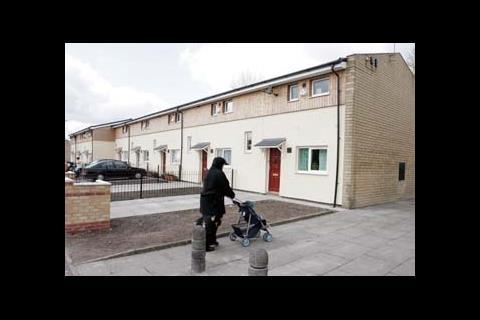Grove Village, Manchester
Problems:
- crime
- guns
- drugs
- low demand
Hewitson’s neighbours, retired nurse Angelica Botsoe and her husband Rene, have had a similar experience since they moved to the area from Ghana in 1988. “Crime used to be a big problem here,” she says. “We had people break into our house and steal our TV one night. We were very scared after that. We put metal bars across all of our windows to make ourselves feel safer. Those who break in are the work of the devil. We rely on God to protect us and he brought us this new development.”
The new development Botsoe is referring to was the first of seven government-backed social housing PFI schemes to begin work. It began in 2003 and was run by registered social landlord Harvest Housing Group and Gleeson Homes which, together with Nationwide, formed the Grove Village consortium to resurrect an area that had infected its residents with a permanent fear of crime. Unfortunately it wasn’t just burglary that the long-suffering residents of the Plymouth Grove estate had to put up with. It was drugs and guns as well. “People were mugged with guns,” says Grove Village director Bronwen Rapley. “Also, it was known in the city that you could buy guns on the estate.”
For Hewitson things reached rock bottom when she and her former husband found themselves taking it in turns to leave the house to go shopping or take their four young children out to play. “We were scared to leave the house empty,” she says. “People would watch you leaving, then break in and take your things.
It was horrible.”
Hewitson wasn’t the only one feeling like they were fighting a losing battle. “There were lots of properties boarded up – no one stayed for very long,” she says. There were 1,050 homes on Plymouth Grove estate but as a result of the drug users and arms dealers who used the estate as well as the groups of kids who used to hang around doing graffiti and other vandalism, 400 of these properties were empty when Grove Village took control of the estate in March 2003.
Rapley was acutely conscious that from the moment the consortium began work it had to show the residents it meant business. “You can have all the legal agreements in the world but the key is the perceptions of residents of you: have you delivered what was promised?” The promise was that Grove Village would be a safer and more attractive place to live. Rapley was determined it was one she would keep.
Those who break in are the work of the devil. God protects us – he brought us this new development
Angelica Botsoe, resident
“The estate was a Radburn layout which tried to separate cars from pedestrians – the result was loads of rat runs,” she says. “We have put in a more traditional grid system that allows for much greater access. We have also taken much of the vacant public space [around the houses] and incorporated it into people’s gardens. The only way into the house now is through the front. Also, the back is much more defensible with new, secure fences and walls.”
To achieve all of this a third of the estate – 450 homes – was demolished, with 650 new homes being built over three to five years for outright sale. The rest have been refurbished, with many homes – including that of Angelica Botsoe – reversed to improve security. “The way it is now you can even leave the door open if you want and not worry that you are going to find someone walking into your house to rob you,” says Botsoe.
All this construction work “really helped to change perceptions of the estate,” says Rapley. “There were 300 builders there nine to five – if you’re going to commit a crime, you don’t want to do it with loads of burly builders around.”
Even when the builders had gone home for the day, the residents were able to rely on the presence of 24-hour security guards who patrolled the estate as a visible deterrent to criminals. They dealt with antisocial behaviour and reported several burglaries to the police. Rapley is proud that she was able to close the service last year “as it was no longer needed”. The Grove Village consortium was able to do this as it had taken a firm line with residents who stepped out of line. “If people were not behaving, we would use antisocial behaviour orders and work with the police to evict them,” says Rapley. “Once people know you are cracking down and they are not going to get away with behaving how they did in the past, then things start to calm down.”
As a result of this hardline approach, Ian Perry, chief executive of Harvest, says: “The gun runners and drug dealers were driven out. They simply moved away to other places where they wouldn’t be bothered. It is obviously not an ideal solution long term but as far as the residents of Grove Village are concerned, they no longer have this sort of thing on their doorstep.”
The consortium’s efforts have reaped rewards, with crime on the estate falling, according to Rapley, by 36% from 2003 to 2006. Rapley is confident that this will drop even further. More importantly people are voting with their feet and flocking back to Grove Village – there is now a waiting list of six years to get into one of Manchester council’s 600 rented properties there. Before the project began residents who wanted to were able to buy their council home for about £20,000. To do this now would cost up to £150,000 and yet 100 people have done so.
But how can Rapley make sure the estate doesn’t simply return to its bad old ways once the builders have gone? “The great thing about PFI is that we are committed to the area for the next 30 years – committed to investing in the conditions of the properties. Having it as mixed-use and mixed-tenure is a huge thing, too according to Rapley: “It is a popular area and as such people don’t want it to slip back anyway.”
Hewitson agrees: “People are really happy. You don’t hear about anyone being broken into at all now. We’ve got new alarms, double-glazing and security locks on all the houses as well as CCTV cameras watching the estate. There’s nowhere for people to hide anymore. It is fantastic. It’s what should have been done with the estate a long time ago.”
Source
RegenerateLive

























No comments yet